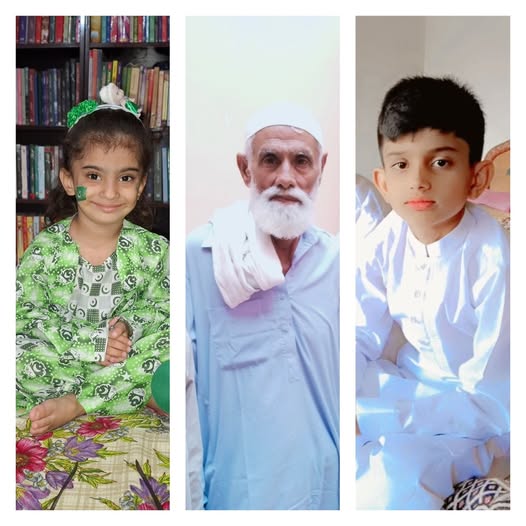“Please Forgive Us”

Rahim Yar Khan, Punjab, Pakistan (Talha Arshad) In the flood-ravaged hamlet of Nur Wala, near Taranda Muhammad Panah, Rahim Yar Khan, the murky water tells a long, silent story of sorrow, helplessness, and pain. For one family, this story became an unbearable tragedy that has cast a permanent shadow over the entire community.
The Baloch family was trying to escape the rising waters when their small boat surrendered to the merciless current. In an instant, three generations were swallowed by the flood. Hassan Khan, a respected elder; his young grandson, eight-year-old Hassan Waheed; and his innocent granddaughter, little Halima, who was no more than five or six, were all lost.

Left to face the devastation is Gul Hassan Khan, the son of the elderly victim and the maternal uncle to the two children. His voice cracks with a grief that is sharpened by betrayal. “In our darkest hour, no one came for us,” he recounts, the names of the absent officials falling from his lips like stones. “Not the MNA, not the MPA. Not the Commissioner of Multan, Musarrat Jabeen. Not the DC of Rahim Yar Khan, Khurram Parvez. Not even the AC of Liaqatpur. They all turned their faces away.”

The cruelest blow, however, came from the one official who did respond. The Assistant Commissioner of Liaqatpur, instead of offering aid, posted a message online claiming the entire incident was a lie. “He insists it never happened,” Gul Hassan says, his voice a mixture of disbelief and fury. “He is trying to erase them.”
Amidst the crushing indifference, a glimmer of humanity came from the Pakistan Army, who arrived to help search for the bodies of his loved ones. Gul Hassan is grateful for their efforts, but his heart remains shattered, especially for his niece, Halima, whose small body was never found.
The words he later wrote for her have filled the hearts of all who read them with profound sadness. In a long, mournful message, he pleaded with the spirit of the little girl he would never see again.
“Halima bibi, please forgive us.
We searched for you so much.
But we couldn’t find you.
Searching for you by boat in sixteen feet of water was so hard.
For three whole days, we searched for you.
We grew tired.
Our hands and feet were swollen.
Our eyes were exhausted.
Even our vision became blurry.
We looked at every single tree.
We looked in every single bush.
We looked through every stalk of sugarcane.
If we saw a piece of cloth in the distance, we went to see.
We left no plastic bag unchecked.
No bottle unturned.
We searched for you for miles and miles.
You were as small as a flower, a piece of my heart.
Your death was written this way, we had even accepted this.
But if only we could have found you…
To read your funeral prayer.
To bury you, to give you back to the earth.
You have left an arrow in us that can never be removed.
While people were running away from the water in fear,
For your sake, we jumped into that same water, I don’t know how many times.
Without a care for our own lives, we searched for you so much.
But you were not found.
This sorrow will consume us for the rest of our lives.
May God will it that you are alive.
May God will it that someone found you.
We will meet you on the Day of Judgment.
Don’t be upset with us.
Please forgive us.”
These raw and desperate words, born from a place of unimaginable pain, did not remain in the void. They traveled across the country, shared from screen to screen, and found a home in the hearts of strangers. People who would never know Halima wept for her. They shared her uncle’s grief, cursed the indifference of those in power, and sent prayers into the universe for the little girl who was as small as a flower. Gul Hassan’s lament became a national sorrow, a testament to a love that even the floodwaters could not wash away, and a painful reminder of a forgiveness that would forever go unheard.

